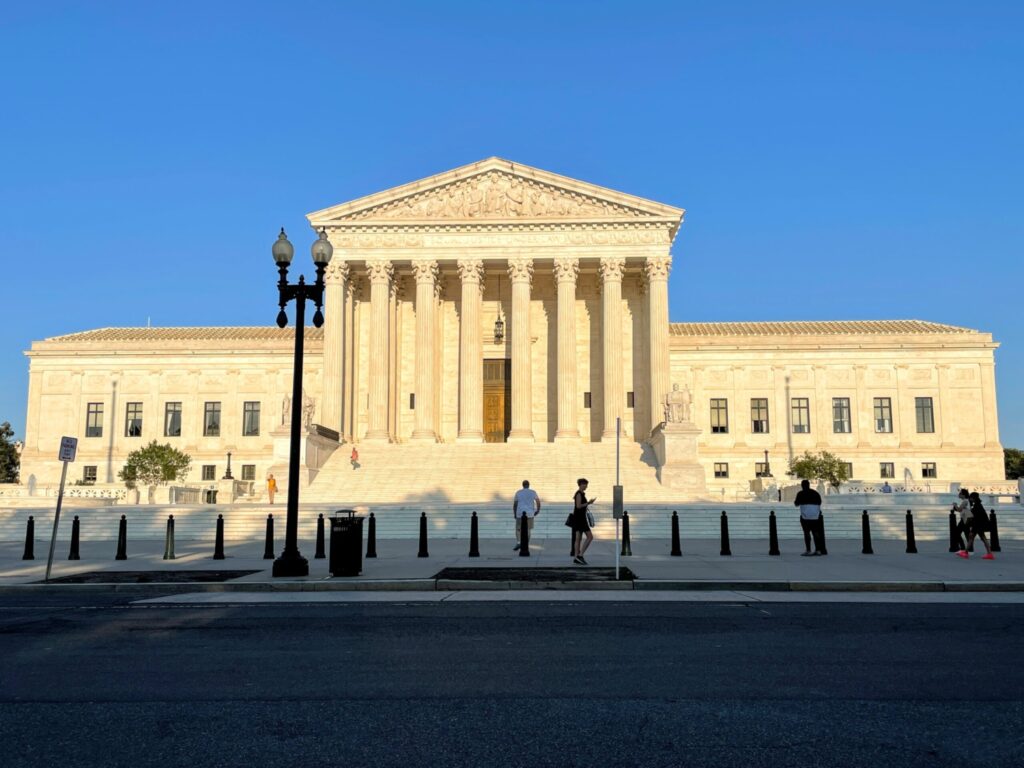
The U.S. Supreme Court in Washington, D.C. (Seth Tupper/South Dakota Searchlight)
A Friday decision by the U.S. Supreme Court set the stage for a law restricting access to online pornography to take effect Tuesday in South Dakota, but the ruling doesn’t shield the state from lawsuits.
In Free Speech Coalition v. Paxton, the nation’s high court ruled that a Texas law requiring adults to prove their age to access adult-oriented websites is constitutional.
Under the Texas law, websites where one-third or more of the content is pornographic would have to collect information like photo identification or credit card information before allowing access.
The Free Speech Coalition, an adult entertainment industry group, argued the law placed an unconstitutional burden on adults.
Governor signs age verification bill and lab-grown meat funding restrictions
The justices disagreed in their 6-3 decision, authored by Justice Clarence Thomas. The court’s three liberal justices dissented.
“Obscenity is no exception to the widespread practice of requiring proof of age to exercise age-restricted rights,” Thomas wrote, citing laws restricting alcohol use or handgun purchases.
South Dakota lawmakers passed, and Gov. Larry Rhoden signed, an age verification bill this year, but its language is more broad than that of the Texas law.
For the law set to take effect Tuesday in South Dakota, age verification would be required of any site that hosts adult material “in the regular course of the website’s trade or business.”
Lawmakers were cautioned during the session that such broad verbiage could draw First Amendment challenges regardless of the outcome in the Texas case. Some argued explicitly for an age verification law that mirrored the one in Texas.
South Dakota’s law requires websites to delete proof of age information immediately after an adult provides it. Adult websites that fail to perform age verification would be subject to criminal fines.
Ruling: ‘Incidental’ privacy infringement acceptable
The Supreme Court’s Friday ruling drew lines around any free speech arguments that might be deployed about South Dakota’s law.
At issue in the Texas case was not just the constitutionality of age verification laws, but how courts are meant to review them.
Texas wanted the Supreme Court to give it – and other states, by extension – broad authority to write laws restricting minors’ access to online pornography. The Free Speech Coalition said age verification laws ought to be minimally restrictive because they affect First Amendment rights.
Neither side prevailed on that issue. Instead, the justices said the Texas law stood up to what it called “intermediate scrutiny.”
The state’s strictures amount to an “incidental” burden on adults’ free speech, but adults can still get the content, the majority ruled.
A law that only requires age verification for sites on which one-third or more of the content is obscene is narrowly tailored enough to achieve Texas’ goal of targeting pornography, the court ruled.
“It is reasonable for Texas to conclude that websites with a higher proportion of sexual content are more inappropriate for children to visit than those with a lower proportion,” Thomas wrote.
In her dissent, Justice Elena Kagan said the state of Texas ought to have tailored its law more narrowly “to ensure it is not undervaluing the interest in free expression.”
Restrictions on free speech, she said, should be viewed with the courts’ most critical eye.
“Many reasonable people, after all, view the speech at issue here as ugly and harmful for any audience,” Kagan wrote. “But the First Amendment protects those sexually explicit materials, for every adult. So a state cannot target that expression, as Texas has here, any more than is necessary to prevent it from reaching children.”
Future for South Dakota law
Unlike the Texas version, South Dakota’s age verification law does not apply to sites with a certain proportion of adult content.
It’s more sweeping language applying it to sites that host porn in their “regular course” of business was a cause of concern for some lobbyists and lawmakers, as well as for Attorney General Marty Jackley.
Lobbyist Doug Abraham told the Senate Judiciary Committee in February that age verification for any site with adult material would be akin to carding anyone who enters a shopping mall because a store in the mall sells alcohol.
Sen. David Wheeler, R-Huron, who’s since been appointed as a circuit court judge, was among the lawmakers who argued on behalf of a bill with a one-third content standard nearly identical to the Texas law. That bill failed.
Jackley told lawmakers that he supports age verification for porn sites, but told them he’d rather defend a law that looks like the one passed by Texas.
GET THE MORNING HEADLINES.
Rep. Bethany Soye, R-Sioux Falls, sponsored the version of the bill that’s set to become law on Tuesday.
Soye told her colleagues that the one-third standard was “made up” by the Louisiana lawmakers who were the first to move on age verification.
A cutoff line for adult content creates a loophole, she said. To avoid adherence to the law, sites could make sure that their adult material represents just under one-third of its content.
Soye also said that legal battles sparked by a strong moral stance are worth the investment of the state’s time and treasure.
As of Friday afternoon, the state had not been sued in federal court over the law.
The American Civil Liberties Union of South Dakota argued against the bill in Pierre. Andrew Malone, its senior staff attorney, said Friday in a statement to South Dakota Searchlight that the Supreme Court “has departed from decades of settled precedents that ensured that sweeping laws purportedly for the benefit of minors do not limit adults’ access to First Amendment-protected materials.”
“With this decision, the court has carved out an unprincipled pornography exception to the First Amendment. The Constitution should protect adults’ rights to access information about sex online, even if the government thinks it is too inappropriate for children to see,” Malone said. “Efforts to childproof the internet not only hurt everyone’s ability to access information, but also give the government far too much leeway to go after speech it doesn’t like — all while failing to actually protect children.”
The Free Speech Coalition did not immediately respond to a request for comment on the South Dakota law, but Alison Boden, executive director, posted about the Paxton ruling on social media.
“As it has been throughout history, pornography is once again the canary in the coal mine of free expression,” Boden said, in part. “The government should not have the right to demand that we sacrifice our privacy and security to use the internet.”
EDITOR’S NOTE: This story was updated at 2:40 p.m. Central time on June 27, 2025, with the addition of reaction from the American Civil Liberties Union of South Dakota.





